Soldiers Not on the War Memorial
|
The Wellingborough News, Friday 4 September 1914, transcribed by Nicky Bates
Wounded - Rushden Soldier in Hospital
Private W A Chubb, son of Mr and Mrs Chubb of Queen street, Rushden, has been wounded in France. The injured man, who belongs to the Duke of Cornwall's Light Infantry, is at present at Brighton in hospital. He has served 12 years and is a Special Reservist. He was only married last Easter.
Friday 11 September 1914
Four engagements - Rushden soldier's Trying Experiences
Rushden Argus, 11th September, 1914, transcribed by John Collins
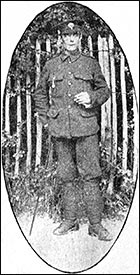 Rushden Soldier - Invalided Home Rushden Soldier - Invalided Home
After Four Engagements
Pte Chubb of Rushden
Who saw service with the Expeditionary Force in four engagements, including Mons, and has returned to Rushden unwounded, but suffering from dysentery. He is hoping to rejoin his regiment very shortly, being desperately anxious to have another go at the Germans.
|
We are pleased to note that Pte Chubb who was invalided home form the front, is now in Rushden and able to call on his relatives and friends.
He has, we understand, been under fire in four engagements, and has seen some horrible sights and scenes. He is very modest, and refused to see any Pressman, but we have heard that he had had an exceedingly rough time.
When he was in hospital the place was shelled, and he is able to confirm some stories of German cruelty to the wounded. When he and other poor fellows landed at Brighton the inhabitants gave them a tremendous reception.
Friday 25 September 1914
Local War Items
Private Chubb, of Rushden, who was invalided home from the front, has we understand, been presented by his wife with a baby.
|
Rushden Argus, 18th September, 1914, transcribed by John Collins
From the Front - Rushden Soldiers Quite Well
Mrs John Dickins, of Dell-place, Rushden, wife of Private John Dickins, of the 19th Hussars, has received a letter from her husband, who is serving with the Field Ambulance in France. The epistle was fourteen days coming, and states that Private Dickins is well. It goes on: “I hope you will cheer up and not worry yourself”. He says he sent two postcards, but expects they got lost—as they really did. He gives no information about the war, stating he is not allowed to.
Private Rowthorne, of Rushden (Northants Regiment), writes home to say he is quite well; and Private Norman, of Orchard-place, sends a postcard home with similar good news; and the same may be said of Private Sugars, of Queen-street, Rushden, who is a “Steelback”.
|
Evening Telegraph, Thursday, 1st October 1914, transcribed by John Collins.
Rushden Soldier Family
Mr. Denton, of 97, Cromwell-road, Rushden, has received letters from his two sons who are serving in France. Walter Denton, who has spent 15 years in the Suffolks, including the Boer War experience, writes from the fighting line. “Just a line to tell you I have pulled through so far, and hope to come through the whole lot with luck.” His third son, Jack, who is with the Northamptons at Weymouth, writes he is going to move from Weymouth on Tuesday for active service abroad. Mr. Denton has another son, Benjamin Denton, in the fighting line, but has not heard from him. He has been in the Army 13 years, eight of them in the Suffolks and five in the Reserves. Another son, Dick, is debarred from serving against the Germans, as he lost four of his fingers fighting for his country in South Africa.
|
Evening Telegraph, Thursday, 1st October 1914, transcribed by John Collins.
Going Abroad
Lance-Corpl. W. Denton, of 60, Cromwell-road, Rushden, who is serving in the Territorials, has spent the last few days in Rushden. He looked very fit and well, and expects to be drafted to the fighting line very shortly, as he has volunteered for active service.
Private A. Tiney, of Manning-street, Rushden, has been home on leave for a few hours before going with his regiment to the front.
|
|
Rushden Echo, 2nd October, 1914, transcribed by Jim Hollis
Rushden Soldier as “Missing” - But Now Safe with The French Army
“Germans cannot last much longer”
Mr. & Mrs. Alfred Sugars, of Rushden, whose son, Private Frank Sugars (2192), of the 19th Hussars, went abroad with the British Expeditionary Force, were considerably perturbed some few days ago when they received an official communication from the War Office reporting him as “missing” after the engagement at Maritz, France, on August 26th, 1914. Since then, however, they have received a letter from their son, addressed from “Department Somme, Albert, France,” as follows :-
“Dear Mother and Father, -- Just a line at last, which I trust will find you both well and not worrying about me, as at present I am quite safe with the French Army, unable to join my dear old regiment, and I feel certain we shall soon have done away with this common enemy, Germany, as they cannot last much longer. We are giving them plenty to go on with and will give them more before we have finished with them, as they deserve it after the way they have treated innocent people.
The envelope in which this communication reached Mr. and Mrs. Sugars is evidently a tradesman’s envelope, being extensively watermarked and bearing the inscription, “Café du Commerce, Divry, Grand Place Albert (Sommes).” In the top left hand corner is written in indelible pencil “Soldat aux Armees Allies.”
|
|
Rushden Echo, 2nd October, 1914, transcribed by Jim Hollis
Rushden Sailor’s Experience - Helps To Capture German Vessel - Late of The “Cressy”
We are delighted to be able to publish a photograph in this issue of a Rushden sailor, Mr. C. Groome, who took part in a smart capture of a German vessel last week.
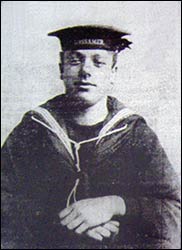 |
|
Mr C Groome
|
Mr. Groome, son of Mr. and Mrs. Groome, of Queen-street, Rushden, was on board H.M.S. Berwick in Mexican waters near Vera Cruz, from where he sent a very interesting letter home. He says the American Government would no allow, without special permission, any but an English man-of-war to cruise about the place where his ship was staying. The mosquitoes tormented them from morning till night. They “could not help scratching, but that made matters fifty times worse.” His eyes were getting quite black, and if he stayed there much longer he “would soon turn into a nigger.” He was “longing to see a little place named Rushden.”
Mr. Groome’s ship was called hastily from Mexico at the beginning of the war and managed to run down a German vessel laden with a valuable cargo of coal, food, etc. The cargo was, of course, confiscated by the British ship.
Some alarm was felt in Rushden when the three English warships, including the “Cressy,” were sunk in the North Sea, as Mr. Groome used to belong to that cruiser. He left it, however, some considerable time ago.
|
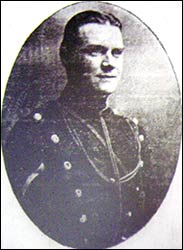 |
|
Lance-Corporal Sidney Knight
|
Rushden Echo, 2nd October, 1914, transcribed by Jim Hollis
Rushden Lance-Corporal Wounded - Injured In The Knee
Mr. and Mrs. David Knight, of Rushden, who have a son, Lance-Corporal Sidney Knight, of the 5th Irish Lancers, serving with the British forces in France, have received an official communication, as follows, stating that he has been wounded: “It has been reported at this office that Lance-Corporal Knight, of the 5th Irish Lancers, has been admitted to No. 20, Field Ambulance, having sustained an injury to his knee.”
|
The Rushden Echo Friday 2 October 1914, transcribed by Nicky Bates
Private George Cave, of Rushden - No News
Reported in our last issue to have been in Belgium, we learn that Private George Cave (Rushden), of the "Steelbacks," was seen in the battle of Mons by Private Magee (Rushden). He was all right then Private Magee states, but unfortunately Private Cave has not written for about six weeks, and the War Office has not replied to inquiries sent there on his behalf.
|
Rushden Echo, 2nd October 1914, transcribed by Kay Collins
In a Belgium Hospital – Private W Brown, wounded
News comes to hand from Belgium that Private William Brown, 8076, of the Bedfords, was wounded in the arm. His card was dated from a hospital in Belgium. Private Brown was called up for action as soon as war was declared and was not long getting into the fighting line. He gives no particulars as to how he got wounded or what the extent of his injuries are. His name figures amongst the wounded in the official list of Wednesday.
|
Rushden Echo, 9th October, 1914, transcribed by Jim Hollis
Rushden Soldier’s Horse Killed
“A Hundred To One Against Us, But We Simply Slaughtered Them - They Fell Like Rabbits”
Mr. and Mrs. David Knight, of Rushden, have received this morning a further letter from their son, Lance-Corpl. Sidney Knight, 3588, 5th Lancers.
Writing from No. 3 General Base Depot, St. Nazaire, he says :-
“Do not worry about me as I am hundreds of miles from the front at present. I have come back here for a rest, but hope to be able to join my regiment very soon. I wrote several times from the front. I wonder if you received my letters. I did not expect to get a reply as I could not tell you my address. I am sending my address, so do write as early as possible as I don’t know how long I shall be here.
“We were very, very quick getting into action. We left Dublin on Saturday and were fighting the Germans the following Saturday.
“It was terrible when we first got to Belgium. They must have been a hundred to one against us. We lost a great many men, but we simply slaughtered them. They fell like rabbits. It was terrible work the first week, fighting all day and riding all night.
“I think that things are working better now, but no doubt you know more about it than I do as we can’t get much news down here. We have lost about eight officers altogether; I don’t know how many men, but our regiment has been very lucky. My troops officer was captured in the early part of it. We were having plenty of food at the front but couldn’t get much rest. No doubt it is much better up there now.
“We have lost a lot of horses. Mine was killed by a shell from the German artillery. Have you heard any news concerning Harry Newell or H. Knight? I have not seen any of them. I saw Percy Colson, from Rushden, at Mons, but have not seen him since.
“We seem to think that the war will last a long time, but, of course, we don’t know. It will be very hard work this winter but we shall win in the end. The Germans are not very fond of our lances, but we don’t study that.”
|
Rushden Argus, 9th October, 1914, transcribed by John Collins
Can’t Get Tobacco - Plaint of Rushden Soldier at the Front
Private Edwards, of the “Steelbacks,” son of Mr and Mrs Edwards, of 64, Crabb-street, Rushden, writes home from the front to his parents a letter in which he says:—“Am getting on jolly fine, in the best of health and spirits, and hopeful chance of getting home . . . Well, the only thing I want is tobacco; we can’t get any. I must remind you again — send as much as you can afford. Please send quickly.”
|
Rushden Argus, 9th October 1914
Private H Rowthorne,
B Company, 1st Northants Regt.,
now in hospital wounded.
|
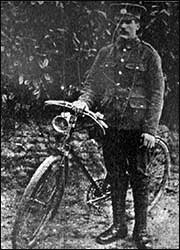 |
|
Rushden Echo & Argus, 9th October 1914, transcribed by Kay Collins
Rushdenite’s Humorous Story – Off to Fight ’Em
Having joined the Imperial Service League, Private Thos. Chas. Watts, of Rushden, writes to say that he expects soon to be off to fight ’em. He is at present at Woolpit, near Bury St. Edmunds, where his regiment are having severe training digging trenches, etc. One of his comrades amusingly said he wished he has been a bird so that the cat had gobbled him up rather than he should have known his present experiences!
|
Rushden Echo & Argus, 9th October 1914, transcribed by Kay Collins
Rushden Man Reported Dead
Unofficial news reaches Rushden of the death of Private Charles Robbins, of Rushden, who has served with the Lincolnshire at the front. The news is not credited and we trust it is not true, as his friends have quite recently received news to the effect that he was quite well. He went out at the commencement of the war and has written several times to say he is all right. Private Robbins served for some years in India.
A letter received this (Friday) morning says that Private Robbins is well. He thanked his friends for a pipe which he received. He was then “smoking an old clay.”
|
Rushden Argus, 16th October, 1914, transcribed by John Collins
Captured Germans
Mrs. Norman, of Queen-street, Rushden, received a postcard from her son, Private Harry Norman, who is a motor transport driver at the front, saying that he is quite well and “saw Charlie (his brother) the other day taking some Germans down to some station. He is all right.”
|
Rushden Argus, 16th October, 1914, transcribed by John Collins
A Fine Time
Mr. Ben Hinde, late drummer of the Rushden Temperance Band, who is now in camp with the Royal Irish Fusiliers, writes Mr. Page, of the Orchard, Rushden: “I am in the pink of condition, and having a fine time at a village about fifteen miles from London.”
|
Rushden Echo, 16th October 1914, transcribed by Kay Collins
Wounded - Private Horace Clayton, 7560, of the 1st Northants Regiment, of Rushden, manager of the Bozeat branch of Messrs P. Collins & Co. , of Rushden, was wounded in the battle of the Aisne, receiving a bullet in the chest. Writing to his father and mother, Mr. and Mrs. Wm. Clayton, of Rushden, from No. 6 Temporary Hospital, Tersagoture, Nantes, Loire, France, he says: “Just a few lines to let you know that I am getting on all right, and hoping this letter will find you the same. You must excuse me for not writing to you before now, for I have not had much time to write to anybody. I have been wounded in my left side and have been through an operation and had the bullet taken out of my back. I am getting on nicely now, and am able to get about again so you need not fret about me for I am happy as a King out here.” Private Clayton had only been married about three months when called to the front.
|
The Rushden Echo Friday 23 October 1914, transcibed by Nicky Bates
Rushden Man Reported Dead - Unofficially Announced to be Killed - No Confirmation
Private George Cave, of Oswald road, Rushden, who went to the front about nine weeks ago with the 1st Northants, is unofficially reported killed. No news had been received from him for several weeks but an Irthlingborough soldier writes to say that he saw Cave fall in action. Mr Cave, (Private Cave's father) has wired to the War Office for official confirmation or otherwise of the death. No reply had been received this morning.
|
Rushden Echo, 23rd October 1914, transcribed by Kay Collins
Rushden Man Leaves England – Destination Unknown
Private J T Farrer, 8787 No.6 Platoon Cycle Company, 8th Division, son of Mr. and Mrs. R. Farrer, of 58 Crabb-street, Rushden, has written to say that he is leaving England with his regiment. He says: “We are off today. I don’t know where we are going yet.”
|
Rushden Echo, 23rd October 1914, transcribed by Kay Collins
Local Man at Front – “Bullets Flying About”
Another interesting letter comes from Pte. C. Dowsett (Rushden), of the Grenadier Guards, still fighting against Germany. Writing to his wife, he says: “I sent three postcards and could not make out why you did not receive them till I got this last letter. I received a nice box of cigarettes from the factory. I hope the horrible war will soon be over. The weather is very nice here in the day time but awfully cold at night. Woodbines are the only comfort we have—when we can get a smoke. When I think of you and my dear children, when I am in the trenches and the bullets are flying about, it makes me feel downhearted at times. Please God, I will soon be back with you and my dear children.
|
| The Rushden Echo, Friday 30 October 1914, transcibed by Nicky Bates
Rushden Men at the Front
Privates F and G Line, of Rushden, and Private A Ward, youngest son of Mr and Mrs J Ward, of Park place, Rushden, left Winchester on Wednesday, probably for the front. They all belong to the 2nd Northants Regiment, and as Special Reserves were called up at the beginning of the war. They were allowed to spend last week-end at home to wish their friends and relatives "Au revoir." We understand that they have been stationed at Winchester for the past two weeks with the Northants Regiment. Privates Line and Ward left Rushden on Monday evening by the 6 p.m. train, a number of friends and relatives assembling at the station to see them off and wish them good luck. All three men went off in good spirits.
|
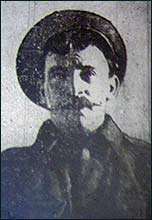 Rushden Echo, 30th October, 1914, transcribed by Jim Hollis Rushden Echo, 30th October, 1914, transcribed by Jim Hollis
German Shells All Around - Rushden Soldier’s Thrilling Experiences
“Men killed on each side of me - Getting our own back”
As reported in the “Rushden Echo” recently, Private A. Ayres of Oswald Road, Rushden, and of the “Steelbacks,” was injured in the jaw by a bullet. Writing to his wife from a hospital in Exeter, he sends an excellent account of some of his experiences. Mrs. Ayres permits us to make the following extracts from the letter :-
“No doubt you would like to have a little of my experience. Well, the first day we entered the firing line we had orders to take a village, our big guns taking a good place on a hill about a mile from the Germans. Our company had to advance in front of our guns for about 600 yards.
“I thought our number was up - the German shells dropping all around un, men getting killed on each side of me. We had to lie flat on the ground. We could not fire a shot. Our big guns did the work that day. But we had our own back the next day, our big guns,
Playing Hell with The Germans,
hundreds getting killed. After a few days of very severe fighting I got my packet, having a bullet through the jaws.
“The night before I was wounded we had got orders to get to a big hill and dig trenches very deep. When morning came we found we were only 600 yards off the German trenches. Every minute I was in the trenches during the severe fighting you could hear the shells burst. It was terrible - like a lot of bees in the air. It was raining day and night, being so cold we could not get a wink of sleep.
One night I was on sentry duty about 50 yards in front of our trenches. We could hear the Germans laughing in their trenches. I was standing against a wheat-stack. There were three Germans and one of our men dead at the side of the stack. Just as it was getting light one of our men went round the other side of the stack and
The Germans Saw Him
You should have heard them firing. How we men got back to the trenches I do not know. The Germans came up to their first line trenches some fifty yards away, which they dug out a week before. We were having a good bit of sport, but the wet spoilt it. We could not miss them as they came up in such thick lines, not a yard apart. (Tell David Baldrey) It was fine shooting, the best I have had in my life - a bulls-eye every time. I had just told one fellow to go down to the hospital - he had three fingers shot off. Little did I think it was my turn next. I got out of the trench, and as I crawled down the field about 700 yards I received another bullet through my trousers and pants. I will tell you a good deal more when I get home, as I have seen some terrible sights. I have just had General Buller’s daughter to speak to me, asking me details of the war.”
|
Rushden Echo, 30th October 1914, transcribed by Jim Hollis
Rushden Soldier Hurt - A Bullet Wound - Passes Right Through The Shoulder and Smashes His Rifle
Private W. Welsh, son-in-law of Mr. and Mrs. J. Brown, of Rushden, has written to his wife from Connaught Hospital, Aldershot, to inform her that he has been wounded. Private Welsh belongs to the Bedford Regiment and was called up for active service on August 5th. He writes :-
“I arrived here to-day, have received a slight bullet wound in the shoulder, but I am pleased to tell you it is going on well, and I hope to be with you and the children in a week or two,” in a letter received on Wednesday morning he says : “I shall be glad when I am able to come and see your face again as it seems years since I saw you and the children. It is my right shoulder. The shot went right through it, smashing my rifle after. I expect I shall have to go to a home for two or three weeks, so I shan’t be home for a week or two. I shall be glad to see you all again. I have not seen anything of Ernest and Joseph (his brothers-in-law, also at the front), but I expect they are all right.”
|
| The Rushden Echo Friday 30 October 1914, transcribed by Nicky Bates
Some Rushdenites - Huts Instead of Tents
Writing home from Weymouth, Private Whiting (Rushden) says they are building huts ready to live in during the winter.
Home for the week-end Private T. C. Watts, of Rushden, says they have been severely drilled at Woolpit digging trenches, etc.
Privates A and W Gibbs (Rushden) are respectively in the "Specials" and the Northants just returned from Egypt. They are waiting at Winchester for orders to proceed to the front.
|
Rushden Argus, 6th November 1914, transcribed by Kay Collins
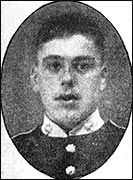 Promoted in the Field - Wounded Rushden Soldier Rewarded Promoted in the Field - Wounded Rushden Soldier Rewarded
Corpl. John Baker, of Sussex-place, Rushden, who is serving the colours in the 1st Northants, writes an interesting letter home to his mother telling of his promotion. Corpl. Baker has been in the Army three years, and was made lance-corpl after 12 months’ service. He is now in All Sanits’ Hospital, Vauxhall-road, London. He writes: “I have been sent to England with a wound in my right shoulder. I don’t think it is a serious wound, but the bullet is still in my shoulder, so I suppose I’ll have to go through an operation. It does seem different now, mother, being away from all those bullets and shells flying and whistling over my head. I got wounded on a Friday night, and arrived in England on Tuesday morning. I got made full corporal on the field, and then I had to come off the machine gun and join the company, because they lost so many N.C.O.s. I don’t suppose I should have got this (the wound) if I had not joined the company.”
|
|
The Wellingborough News Friday 2 November 1914, transcribed by Nicky Bates
Local War Items
Mrs W H Baker, of Sussex place, Rushden, has heard from her son, Lance-Corpl Baker, who is wounded and in All Saints' Hospital, London. He says, "My right shoulder gives me much pain. I was operated on this week, and am getting on satisfactorily."
|
| The Rushden Echo Friday 13 November 1914, transcribed by Nicky Bates
Dr Greenfield Attends Rushden Soldier
Not willing to let his mother know of his illness, Private H J Norman (Rushden), lately a motor-'bus driver in the district, writes from Rouen, France to say he has "seen Dr Greenfield." But we are given to understand that Private Norman is under the doctor's care, and has been in hospital for ten days. The letter is as follows: - "I am glad to hear that everything is going on satisfactorily in Rushden. I have seen Frank Sugars, and he is quite well. I have also seen Dr Greenfield* and he was very pleased to see me. Albert Lawman is in No. 12 Hospital here. I was going to see him yesterday but could not get there. I will go to-day if I can. I am all right myself. The weather is very cold now but I have got plenty of good warm clothes. I had a letter from Mr Newberry the other day; the first letter I got since I left England, and he told me you were fairly well. Remember me to Harry. I hope he is well. Tell him I will teach him the French language when I get back."
*Dr Dudley Greenfield was a doctor at Rushden.
|
| Rushden Argus, 13th November 1914 |
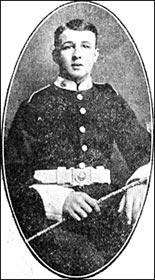 |
Private Sidney Denton and his brother, Private Reg Denton, of Rushden, are at present wounded in hospital at Liverpool. They are both in the 1st Northamptons. A postcard states Sidney has received a wound in the arm, and Reg a dangerous wound in the leg. They refer to Private C G Glidle, of Rushden, whom they are afraid has been killed. |
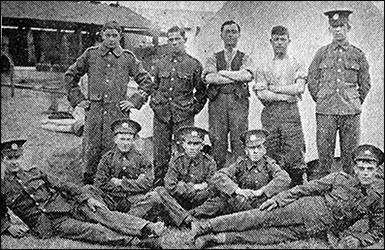 |
|
The centre figure of the back row, in waistcoat and shirt sleeves, is Private Reg Denton, of the 1st Battalion Northamptons, who is seriously wounded in the leg. The other men are all from Rushden, and now on active service. (Picture taken at Shorncliffe)
|
|
The Rushden Echo, 13th November 1914, transcribed by Jim Hollis.
Two Rushden Men Wounded - Brothers in Arms - Privates Reg. & Sid Denton
Mr. and Mrs. F. Denton, of Rushden, whose two sons, Privates Reg and Sid Denton, have been serving with the Steelbacks at the front, have received news to the effect that both have been wounded. Private R. Denton is now in the military hospital at Liverpool, having been wounded in the calf. He writes to his parents as follows :- “I shan’t be home for some time, as the bullet in its course smashed my bone and so makes it much worse.” He asks his father to thank the members of the W.M.C. for sending him cigarettes.
Continuing he says: “Whoever wrote that letter to me says that Whiting has been taken a prisoner, but I think he is killed, but I won’t contradict. Chris Glidle is dead, as he was killed at my side in a night attack. He was shot under the heart. I am writing to Sid; he was wounded in the fight the day before I got hit. It is terrible out there, I can tell you, the day I was shot, that was a week last Friday, and I can tell you I was very glad to get out of it then, but had I known then as much as I do now, I would sooner have been killed, I can tell you. After what I have suffered at the war it will go hard if any of them ever interfere with me in my future life or anybody who has had anything to do with them that I know.”
Private S. Denton, who is in hospital at Rouen, France, writes: “I am in hospital, wounded. Dr. Greenfield is here, and comes to see me every day. He got me a pipe to smoke, and said he was going to write to his wife and tell her to come along and see you.”
We understand from Mrs. Denton that Mrs. Greenfield has kindly carried out her husband’s request, and conveyed the information that Private S. Denton has lost a finger.
With reference to Private R. Denton’s report that Private Whiting has been killed, we are able to state that his mother has received a postcard from her son Herbert, in his own handwriting, posted from Gottingen, Germany, stating that he is a prisoner of war.
The reference to Glidle is not at present confirmed.
|
Rushden Argus, 13th November 1914, transcribed by Kay Collins
News of Rushden Soldiers
Private H. J. Norman, of the Army Service Corps, M.T. Advanced Base, writes a letter to his mother, Mrs. Norman, of Orchard-place, Rushden, saying: "I got the Rushden ‘Argus’ when it was three days old. I have seen Frank Sugars (another Rushden man) and he is quite well. I have also seen Dr. D. G. Greenfield and he was very pleased to see me. Albert Lawman (whose mother lives in Orchard-place) is in No. 12 Hospital in France. I was going to see him yesterday, but I could not get there, but I shall go today if I can. The weather is getting very cold now, but I have got plenty of good warm clothes. I had a letter from Mr. T. Newberry, of ‘The Compass,' Rushden, the other day, the first letter I've got since I left England."
|
Rushden Argus, 13th November 1914, transcribed by Kay Collins
Wearing- Rushden Boots
Mrs Hinde, of Crabb-street, Rushden, received a letter this week from her husband, Private J. Hinde, A.V.C. of the 1st Dragoon Guards, as follows:- "I am quite well and safe. I saw a great lot of Belgian refugees all in a cattle truck; men, women, and children, huddled together. It was a terrible sight. They asked us for food, and of course we gave them what we could, and they ate it like mad. Some of our regiment have arrived from India. I should like to see them, but I am afraid I shall not. Just had some new boots given out, one pair of putties, and one pair of socks, and my boots were made at Denton’s factory, Rushden. A souvenir from Rushden. Don't forget the "Xmas Duff."
|
Rushden Argus, 13th November 1914, transcribed by Kay Collins
Rushden Soldier “In the Pink”
Private Charles Norman, of the 1st South Lancashire Regiment, writes home to his mother, Mrs Norman, of Rushden: “I received the Rushden ‘Argus, ’ which I was very pleased with. I have got plenty of shirts—as many as I want to carry. It doesn’t fo to have too much, as it tells if you have to carry them a good distance. We receive plenty of tobacco. Tell Henson (who is a friend of his and lives at Wellingborough) I am looking after Captain Herbert’s horse now we are with the transports. Did you know that Busby was at home? He went before Pte. Henson.” He had seen two or three Rushden fellows out there, namely, Jesse Darnell and Sharp of the Hussars. “I was very pleased,” he continues, “with the ‘Argus.’ I had a very nice read. Keep smiling, as I am just going to cook my dinner. I see they still carry on the dancing at the Co-operative Hall. I should like to have the two-step. Hoping you are all in the best of health, as I am ‘in the pink.’”
|
Rushden Argus, 13th November 1914, transcribed by Kay Collins
“Like a Drowned Rat”
Driver Frank Griffith, of the Army Service Corps, writing to his parents at 136 Cromwell-road, Rushden, from France, says: “I got the ‘Argus’ quite safely, but no letter. Every time I go for the post it is the same ‘Noh poh,’ which is what they say for ‘Not got any.’ The weather is getting very cold out here: God knows what it will be like about Christmas. I reckon we shall come back like snow men. I had a narrow escape the other day. When I was watering my horse it stumbled, and in I went. I came out like a drowned rat. I didn’t take much notice of getting wet, as we often get wet through lying out in the open. Many a night I wake up and find myself drenched.”
|
Rushden Argus, 13th November 1914, transcribed by Kay Collins
Money No Use at The Front
Lance –Corpl. H. Parker of the Royal Irish Fusiliers, writing to his wife, Mrs. Parker, of Newton-road, Rushden, says "I have only drawn 10s. since I have been out here, but it don't matter as money is no use to us here yet."
|
The Rushden Echo, 20th November 1914, transcribed by Jim Hollis.
Rushden Hussars in Action - A Glorious Charge
Private Harry Silburn - The Only One to Return - His Horse Shot Under Him
Pte. H. E. Silburn, of the 15th Hussars, who is serving with the British Expeditionary Force, writes to his parents at Rushden to say that he is quite all right and going on well. “I have,” he says, “met a few fellows out here from home. It is surprising how you run across different people out her.”
Private Sharpe, of Rushden, also of the 15th Hussars, has, we understand, reported to Private Silburn’s parents that their son Harry was the only one who returned after a glorious charge of the 15th Hussars, and he was on foot when he reached the British lines, his horse having been shot from under him. An interview with Private Sharpe appeared in our last issue.
|
The Wellingborough News Friday 20 November 1914, transcribed by Nicky Bates
Local War Items - War Won't End So Quickly
Private Albert Allen, of the 19th Hussars, son of Mr and Mrs Allen of Cromwell-road, Rushden, writes to his parents: "I don't think I shall sit beside Mr Chettle at the club dinner this Christmas. Tell him I don't think this war will come to an end so quickly as some think it will. We have made a good stand in this place where we are, at present. We have been here three weeks, and have expected to retire every day, especially Sunday night (Nov. 8th), as that is the day they seem to do the most fighting. But the khaki-boys have got used to all their tricks now. We do most of our work at night-time, so that we can get up to the firing line with ammunition without being seen. Then we can supply the men in the trenches with plenty of ammunition. We are having some very cold weather, but still we don't mind that as long as we can wipe the Germans out of it and roll on."
|
The Rushden Echo, 20th November 1914, transcribed by Jim Hollis.
Rushden Soldier Seriously Ill - Suffering Severely From Wounds
We are extremely sorry to report that Private E. E. Sawford, whose photograph appears in this issue, and whom we reported wounded in our last issue, is now in a very precarious condition and not expected to recover from his wounds. His wife has been with him in the hospital at Sheffield for the past week and yesterday his sister, Mrs. H. Houghton, left Rushden at once on receipt of the bad news that he might pass away at any time. In our last issue we reported that Pte. Sawford was well-known in Bozeat. This, we regret to say, was an error on our part. We should have reported that he was well-known in Earls Barton.
|
| The Rushden Echo Friday 20 November 1914, transcribed by Nicky Bates
A Patriotic Rushden Family - A Wounded Soldier
Pte Ernest King (Rushden), 2nd Northants Regiment, who is serving with the British Expeditionary Force, writes home to his wife to say he is quite well. He fought right through the South African war, and was called up as a reservist to serve in the present war on August 4th.
Pte King has one nephew who has been wounded while serving at the front, viz., Pte A Lawman, of Rushden, and another nephew, Pte J Lawman, of Rushden, is in Kitchener's Army.
Pte Fred King, of the Duke of Cornwall's Light Infantry, brother of Pte Ernest King, recently returned from Hong Kong, where his regiment has been stationed for the past four years, and he expects to be sent to the front shortly.
Another brother, Pte William King, is in Kitchener's Army, and a brother-in-law, Mr J Fields, also of Rushden, went to enlist yesterday.
|
The Rushden Echo Friday 20 November 1914, transcribed by Nicky Bates
English Not Understood - "Might As Well Talk to a Brick Wall"
Pte George Line (Rushden), of the Steelbacks, writes from the front to say he is quite well. He says "You might as well talk to a brick wall as talk to the French and Belgians." Evidently he finds it difficult to converse with them. His brother, Pte Fred Line, with the 2nd Northants, has been at the front a fortnight and writes to say he is well.
|
Evening Telegraph, Wednesday, 25th November 1914, transcribed by John Collins.
Rushden Privates Wounded
Mr. and Mrs. Jones, of Pytchley-road, Rushden, had a letter from the hospital which Pte. Robbins is in, stating: “Private C. Robbins (Rushden), of the 1st Lincolnshire Regiment, was admitted in No. 2 General Hospital, Outreau, Pas-de-Calais, France, on November 15th, suffering from wounds in the ribs and shoulders. He is going on well.”
We are sorry to report that Private Fred Bass, of Rushden, has been wounded in the thigh and is now in a hospital in Cosham, Hants.
|
The Rushden Echo Friday 27 November 1914, transcribed by Nicky Bates
Rushden Marine's Career - Mr John V Meadows Obtains His final Discharge
Mr John Vawser Meadows, of Rushden, (of the firm of Messrs. Meadows and Rattley), after 34 years' service in the Royal Marine Light Infantry, has obtained his final discharge, which reached him on Saturday last. Mr Meadows has seen an enormous amount of active service, and has been pretty well all over the world, including the East Indies, the West Indies, Australia, New Zealand, round the New Hebrides, the South Sea Islands, Solomon Islands, new Guinea, Bermuda, etc. In 1884-5 he served through the Egyptian Way, and wears the medal of that war and the Khedive Star. For two years he was in Crete, where the Turkish massacres of the Cretans had caused such desolation, and he was present at the hanging of the 17 Bashi Bazouks. At this time Mr Meadows was serving with Sir John Knowle. It was while he was on his holidays this year that he was called up as a reservist. After serving eight weeks at Chatham, he was removed to Deal where he had two week's service, and now he finishes his career with the Forces. Everybody in Rushden will wish for him a long life and the rest which he so well deserves.
|
The Rushden Echo, 27th November 1914, transcribed by Jim Hollis.
For an article about Private A Ayres see Conditions in War 1914 |
Rushden Echo, 27th November 1914, transcribed by Kay Collins
“Plenty of Food” – Rushden Man at the Front
Private J. Farrar (Rushden) of the 6th Platoon Cycle Company, who recently went out to the front, writes to a friend in Rushden this week to say he is the best of health. He continues: “I got your letter and fags all right—I was longing for a smoke. We get plenty of food but the weather is cold. It is snowing fast and we feel it a bit now just coming from a hot country. I shall be glad when we all meet again.”
|
Rushden Echo Friday 27th November 1914, transcribed by Susan Manton
Rushden Private Injured - Severe Wounds - Good Hope of Recovery
News comes to hand this week that Pte. Ernest J. G. Brown, son of Mr. J. Brown, of High Street South, Rushden, has been badly injured in the head. Writing from a hospital in Havre, one of the Sisters says: “The medical officer considers the injury severe, but we have good hope of his recovery, as he is slightly better this morning.”
A further letter from the same writer says: “The medical officer wishes me to let you know that your son is progressing as favourably as can be expected. I hope to be able to continue to give you good news. Yours sincerely Sister Lyde. P.S. I have just been and asked him is he has a message to send to you. He sends his love and hopes to be home for Christmas.”
Mr. Brown has six sons and sons-in-law on service in England or at the front: Ptes. E. J. G. Brown (mentioned above); Siah W. Brown, at the front with the Leicesters; T. Cox, fighting with the “Steelbacks”; I. Brown at Languard with the Bedfords; W. Welch at Basingstoke military home; and J. Smith, who is at Tonbridge Wells Hospital wounded.
The latter was injured in the right hand on November 17th being stuck with a piece from a shrapnel shell. The last news from him states that he is going on very favourably. The information comes in a letter from Sister C. Gwynne, of the General Hospital, Tonbridge Wells and is as follows:-
“Dear Mrs. Smith, Your husband is getting on nicely. The hand has cleaned up splendidly. He says it is much easier. The surgeon who attends him has not yet decided what he will do, as he wants it to be quite healthy before he does anything. He may only have to take away the middle finger. Your husband sends his love to all.”
|
Rushden Echo, 27th November 1914, transcribed by Kay Collins
Rain and Snow – And No Football!
Private W. Austin (Rushden), who has been in the forces for seven years and has served in India, writes home from the front as follows: “We are having very bad weather now. The rain and snow are making very cold. I suppose you are getting ready for Christmas. Don’t forget that my birthday is getting close, so you must have a good time of it! Thank Ernest and the shopmates for the fags which I received. In the trenches I enjoyed smoking them—not half! There is no footballing here. We are hanging on for a linesman but I am getting too old for that.”
|
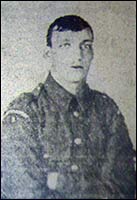 |
|
Private A Denton
|
The Rushden Echo, 4th December 1914, transcribed by Jim Hollis.
Serving at The Front
Mr. and Mrs. Denton, of Station-road, Rushden, have two sons serving at the front. Pte. H. Denton is with the R.A.M.C. and Pte. A. Denton is in the 2nd Northants. Pte. A. Ayres, who was interviewed by a “Rushden Echo” representative last week, is a son-in-law of Mr. and Mrs. Denton.
|
The Rushden Echo, 4th December 1914, transcribed by Jim Hollis.
Rushden Soldiers Shelled - Private H. Eden Reports the Death of Private Robinson
“I think we are in for a hard winter,” writes Private H. Eden (Rushden), of the 2nd Northants, in a letter sent home from the front. He continues: “I received parcel and ‘Rushden Echo’ safely. The parcel was in good condition and I must say it is very good of you all. We got shelled on Saturday, Nov. 21st. we had two killed and one wounded. Robinson, of Little-street, Rushden, was one of the two killed. I shall be very glad when this lot’s over!”
Private Eden is the adopted son of Mr. and Mrs. J. O’Brien, of Rushden. His father was a gardener at Castle Ashby. His brother Bernard was recently given a commission for services on the field, but is now unfortunately in a hospital wounded.
|
Rushden Echo, 4th December 1914, transcribed by Kay Collins
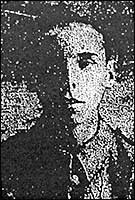 Rushden Soldier on the Move - “Night Attacks” – “Nearly Drowned in Mud” Rushden Soldier on the Move - “Night Attacks” – “Nearly Drowned in Mud”
Private F Neville (Rushden), 7691 of the 9th Bedfords, writing to his mother from Felixstowe says the soldiers in that camp are being kept in a fit condition by vigorous exercises, drills, and skirmishes. Describing an ordinary day’s work, he says: “We turn out at six for parade and gymnasium for an hour or so. Breakfast consists of salmon or other kinds of fish, after which meal we have parade, squad drill, and skirmishing (with plenty of running about) until dinner. We dine on roast or boiled beef with potatoes and beans. At 2p.m. we are given an hour’s signalling practice, which is very useful for every soldier in war time. The remainder of the afternoon we have to ourselves. Twice a week we have a route march or a night attack. When we have a night skirmish there is plenty of sport—some get lost and others are nearly drowned in mud. You cannot see where you are going to, as it is so dark. Remember me to all my pals and thank the shopmates for sending fags.”
Private Neville is expecting to be drafted to the front almost immediately.
|
Rushden Echo Friday 4th December 1914, transcribed by Susan Manton
Rushden Telegraphist - Volunteers for Service
Mr. Cecil N. Clark (son of Mr. John Clark of High Street, Rushden) formerly telegraphist at the Rushden Post Office and now at the Wellingborough office, has volunteered for service as a signaller and telegraphist. Four other members of the Wellingborough office staff (Messrs Douglas, Beale, Ward and Plowman) have volunteered for similar work. Mr. Beale and Mr. Douglas have already gone, and Mr. Clark and the others may be sent at any time.
|
Rushden Echo Friday 4th December 1914, transcribed by Susan Manton
Another Go at the Germans - Rushden Soldier’s Expectation
Lance-Corpl. Frank Allen (Rushden) writing this week from the base says:-
“It is very cold here now. There is snow on the ground. But cheer up, we are pulling through as well as we can. I have been in hospital three weeks with dysentery, but am getting better now. I shall soon be going back to have another go at the Germans. I hope Albert (his brother) is all right. Give my love to all at home.”
Private Albert Allen, brother of the Lance-Corporal, sends a Field Service card to say he is well.
|
The Rushden Echo, 11th December 1914, transcribed by Jim Hollis.
A Rushden Promotion - Col.-Sergt.-Instructor Bullard
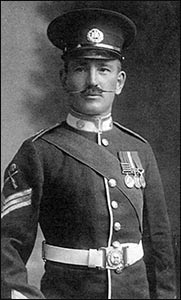 |
|
Sgt Major Bullard
|
Few if any soldiers have been more deserving of promotion than was Col.-Sergt.-Instructor, now Sergt.-Major Bullard, of Rushden. It is not easy to calculate the soundness of the manner in which he has fulfilled his duties.
About six years ago he came to this district and found the need for much tact and business ability in getting two of the companies together in friendship. These were bitterly opposed to each other, but through the genial good nature of the sergeant, the two companies were eventually cemented in the best of friendship. This was no ordinary task, and had filled previous officers with despair.
Sergt.-Major Bullard was also very successful in keeping alive the enthusiasm of the “Terriers,” and never failed to gain each man’s respect. In fact, he was looked up to as a gentleman worthy of high esteem. No matter who the Territorial is who has been under Sergt.-Major Bullard, he has nothing but praise for the officer.
But quite apart from commendable characteristics the Sergeant is one of the best shots in the county and in signal instructing he is a past master. A good all round soldier, he fought right through the South African War, where he gained valuable medals. He served in the Methuen trekking, gained distinction on the Indian frontier War, and has since done invaluable service at home.
The Reserve Battalion, to which he is now attached, gains what Rushden loses.
|
The Rushden Echo, 11th December 1914, transcribed by Jim Hollis.
German Officers’ Vile Outrage - An Unparalleled Crime - Abominable Act by Eight Prussion “Gentlemen” - Rushden Soldier’s Evidence of “German Culture” - Will Zeppelins Raid England ? - Private W. Danns Says “No!”
“There will be no Zeppelin raid into England. The clumsy big things could be seen from England as soon as they rose up in the air in France. And the Germans have not the pluck to attempt an invasion.” Evidently Private W. Danns, of the Duke of Cornwall’s Light Infantry, and a Rushden postman, holds in very poor estimation the spirit of the Germans. Interviewed by a “Rushden Echo” representative, he quoted the opinion of a Major acting as commanding officer of his who said the war will be finished shortly after Christmas!
“The Germans,” continued Pte. Danns, “don’t want to fight – they are starved too much to feel very antagonistic. They would all run away if their officers would allow them to. But they are driven into it, time after time. And as for the use of the bayonet, we had only one kind of opposition and that was the barbed wire entanglements. A German would always show a clean pair of heels when we charged with our bayonets. I was in two of them, and am sure I accounted for several of the enemy.
“But the most exciting time I had was in a battle on the Aisne. Only about six of us out of two companies returned without being taken prisoners or being wounded. We made a run for it and managed to get back among friends again. I found myself among the French soldiers and eventually reached my own party. The enemy never really ceased firing at any time. Night and day, bullets and shells were sent flying amongst us. It was even possible to get used to their shells exploding round about us. Nothing can waken a man who is so worn out as we were. Some of us have done 21 days at a stretch in the trenches !
“With ordinary precautions, which any soldier could take, you were almost as safe from the rifle fire in trenches as at home in Rushden. I believe that seven out of ten who get killed by rifle bullets while in trenches do so from pure neglect. My pal and I dug ourselves right into the earth with just a little port hole facing the Germans and nothing but a “Jack Johnson” could have killed us. A shrapnel shell bursting just over the trench might possibly have injured us in the legs but not seriously. Whether we were going to sty in the same place or not we always kept improving our trench, digging ourselves further in, throwing the surplus in front, making the outside look like the natural surface, etc. Some soldiers will say ‘Oh, we shall not be here to-morrow and are fairly safe,’ and they do not bother to do what anybody could do to avoid injury from stray shots. A bullet will penetrate the earth a short distance, and if you have not the gumption to make yourself safe from them, well, you deserve to get injured.”
In reply to an inquiry as to his injuries, Pte. Danns laughingly stated that “a man who was meant to be hanged would not get killed,” and he didn’t believe he would get killed. “A shell exploded near to me once, and although it did not strike me, I was bowled over, my rifle knocked out of my hand, and my shoulder dislocated. An officer with his horse was talking to me at the time. The horse was killed but the officer escaped injury completely. But the next day he went blind from the shock.
“But the wound through which I am at home had been inflicted on me for several hours before I knew anything about it. At Ypres we had been in a bayonet charge and apparently one of the Germans caught me in the groin with his bayonet. But I must have settled him, as this was where I saw a few go down. That night I slept in a trench with the rest of our chaps, and blood oozed out on to my clothing and froze into a solid mass. Next day an officer called my attention to it and advised me to see the doctor. “Home at once,” the doctor said, “you have lost enough blood to kill any ordinary man !”
“For quite a long time we have been within about 80 yards of the Germans. We could distinctly hear them haggling and quarrelling with each other in the evenings, with the band playing at intervals. Then our own Scotch pipers would imitate them ! Towards morning the poor wretches would crawl out to pick up a few wurtzels and then sneak back to ‘breakfast.’ It is quite evident that they were starving.
“On the other hand, we were well supplied with food, and sometimes were lucky enough to get hot tea and coffee.
“How long will the war last ? Well, I am not quite of the same opinion as the officer I told you about, but I think it might be finished in twelve months. The French are capital fighters and will never give in. The plucky little Belgians, who stood the brunt of the first six weeks, are naturally a bit sick of it, but are not despairing. The Englishman will never say die, but the chaps who are yet to be heard of and who will be the means of stopping the war, are the Russians. When they get properly into German territory things will begin to move.
“The Germans have broken every recognised rule of war, so that no decision of any conference can be binding now on what the Allies do. The French have given notice to the Prussian military authorities that they are going to use a shell that will kill by the hundreds. It is a poisonous shell and has been proved to kill outright a flock of sheep 500 yards away from where it exploded ! If the Germans come up in their masses in front of them there will soon be something in the way of slaughter that will reduce their numbers. Every victim turns green and motionless. The secret of their manufacture is the patent of a Frenchman.
“The Germans are not only beaten in spirit but look like being beaten for want of money. They have wasted thousands of pounds in firing shells to no purpose. Their biggest shells cost over £100 each. I have seen them fire 1,100 rounds at a bridge from a distance of only 300 yards and not one hit the mark ! They ought to have been able to hit a penny at that distance! The German infantrymen seem to imagine the rifle is a machine gun. It is quite a common thing to see a German place his rifle butt on his thigh and keep pulling the trigger until it is empty and then recharge and begin again. Not many of our shots go astray, though. I saw a German aeroplane brought to the ground with an expenditure of not more than 16 shots. !”
“You had no difficulty in picking out the enemy?” queried our representative.
“Not the slightest,” said Private Danns, “we could tell their ugly mugs at any distance, and the officers could always keep us informed by the use of the telescope, and then our line was always unbroken. We often passed messages for miles from one to another. There was no fear of them getting round to the rear of us and taking us by surprise.”
Continuing, Private Danns said the enemy were prepared to do any dirty trick to gain a mere supposed advantage. In a hospital where he was staying a German bomb fell from one of their aeroplanes. The aviator could not possibly have been mistaken as to the use of the building. There were even German wounded in it. One Englishman who was there suffering from frozen feet said “Let me get at the --------s! I will kill the lot.” But the poor fellow could not get into their ward.
Private Danns saw Private Chubb, of Rushden, at the beginning of the war, lying apparently dead, and was about to bury him but the Chaplain said he was not dead. The Germans were coming on rapidly so they had to leave Chubb. “When I was told, on arriving home, that Chubb was alive, I was very much surprised. He is a very lucky man. About the time I saw Chubb we were in a little village lying in the streets from dark till dawn. As soon as day appeared, a woman ran out in terror shouting ‘Allemands! Allemands!’ The poor woman was a victim to a German bullet. How the Germans got there was a mystery. We all started firing without any orders, and the way we killed the Germans was awful. But they killed a mumber of ours. Out of 1,200 men, only 370 answered to the roll call next morning. But a lot more put in an appearance on the Aisne. We had tried for three-and-a-half hours with Maxims to keep the enemy back and had piled up heaps and heaps of dead Germans, and at last our ammunition was gone and we had to hop it. I should think in that action alone we killed 30,000.”
Asked if he had seen anything of German outrages, Private Danns said he had seen a woman carry a girl of 11 to an English officer and told him that the poor girl had been outraged by eight German officers. The child was covered with blood and was half dead.
“One of the dodges of the Germans was to get up trees and fire at our men. One of them shot 22 of our chaps like that. One morning my pal saw this German climbing the tree. ‘Look at that blighter !” he said, and taking careful aim, brought him to the ground. My pal said he didn’t mind if he did get hit now he knew he had settled a German.
“In burying, the Germans would nearly always leave a leg or an arm sticking out of the ground. We would have made a decent job of it but the Germans fired on us even when we were only burying the dead.”
Private Danns is the champion regimental bayonet fighter, champion boxer in the regiment to which he belongs, was Army and Navy champion in 1906-7 at Gibraltar and in the West Indies in 1908-10. He is a member of the tug-of-war team and plays football. Considering what he has been through we think he has done more than his share.
|
The Rushden Echo, 11th December 1914, transcribed by Jim Hollis.
Rushden Man’s Fine Chance - How To Harass The Germans
Assistance In The Firing Line - A Rushden “Will-O’-The-Wisp”
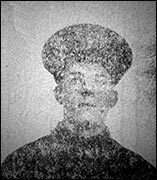 |
|
Gunner Ray Robinson
|
Our hearty congratulations to Mr. Ray Robinson, of Rushden, who has passed with flying colours in the examinations at Bisley in gunnery, motor mechanics, and motor driving. He is thus successful is getting into the 1st Battery of the Motor Cycle Machine Gun Corps, of which the late Col. Cody’s son is a member.
Interviewed this week by a “Rushden Echo” representative, Mr. Robinson gave an interesting account of the origin of this new corps.
“It is unique in the history of the world,” he said, “and England is the first nation to put the idea into practice. For harassing the Germans, nothing better could have been devised than a corps of motor-cyclists who each carry a machine gun. The mobility is at once a safeguard for the driver and effective in checking the work and progress of the enemy. A maxim is fitted to the sidecar and can be unmounted within seconds. Just fancy an order coming from one part of the firing line for assistance. In the ordinary course, the fastest thing was the cavalry, but now (for a time, experimentally) the new motor corps will come to the rescue. Dashing along at a brisk pace, the deficiency is made good. A raking fire pours into the German lines. Before the enemy has had time to locate the motor machine-gunner he has remounted his gun, started the engine, and is off like shot to worry them in another spot, and meanwhile shells are falling harmlessly where the motorist was stationed a few minutes previously.”
“But aren’t you dependent on roads?” our representative asked.
“Well, largely, but not absolutely,” replied Mr. Robinson. “Very severe tests have been passed to the satisfaction of the officers at Bisley. An ordinary grass field offers very little resistance to us. And we can ride over any ground short of the roughness of a ploughed field. The superiority of the motor cycle over an armoured car will be found in the small track along which we can travel. A certain number of us will be under the supervision of officers in an armoured car, which carries all paraphernalia peculiar to motor-cycles and maxim guns. Running up to the firing line, the cars stop out of sight and range of rifle fire and the cyclists run on and, taking the maxim from the motor, fire and do all the damage possible before the shells make the position too hot, then rejoin the officers.
“We are not to be allowed to wear motor goggles in case the sun’s rays are reflected and so reveal us. No lights at night can be used and other precautions are to be taken to preserve a minimum of risk with a maximum of efficiency. Ordinarily we shall be able to fare much better than the soldiers who are confined to the trenches for days and sometimes weeks at a time. They have to rely on the Army Service Corps supplying them with food and ammunition, etc., but we can take a run to headquarters to get supplies in case of shortage.”
Mr. Robinson gave our representative an account of the elaborate preparations which have been made to cope with any contingency that can possibly be dealt with. For obvious reasons we refrain from publishing anything which could be of any service to the enemy. We sincerely trust that Mr. Robinson will have plenty of opportunities for proving his undoubted ability.
It is interesting to note that a London daily paper has aptly termed the new corps “The Will o’ the Wisp.”
|
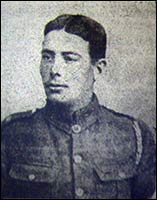 |
|
Private H Norman
|
The Rushden Echo, 18th December, 1914, transcribed by Jim Hollis
Rushden Soldier Ill under Dr. Greenfield “Not Wounded”
Writing to his mother this week, Private Harold Norman (Rushden) says :
“I am sorry to hear you thought I was wounded. I have not been. I don’t know who told you I was. It is true I have been in hospital but not because I was wounded. I went in with a septic mouth, and was in nearly three weeks. I am sorry I cannot tell Mrs. Lawman where her son is now. I was in hospital when I saw him and he was there too. I should think he has joined his regiment again.”
Private Norman, formerly a motor driver, has been promoted to the rank of despatch rider. Since he has been to the base he has been under the care of Dr. Greenfield.
|
The Rushden Echo, 18th December 1914, transcribed by Jim Hollis.
Rushden Seaman At Work - On Submarine B11 - A Wonderful Exploit
“One of the most daring exploits in the history of the world,” is how the marvellous venture of the Submarine B11 was described. We feel that we are expressing the sentiment of the people of Rushden when we speak of our honest pride of the young Rushden sailor who was on board the B 11. Mr. James Edward Buckle, A.B., whose letters have at times appeared in our columns, joined the navy seven years ago and has served on board the submarines B 3, A11, and B11. He is the only son of Mr. and Mrs. J. E. Buckle, of Co-operative Row, Rushden, and is only in his 25th year. He started work for Mr. C. E. Knight, and was afterwards employed by Mr. H. H. Hobbs.
A very intelligent lad, he early gave promise of accomplishing more than the average boy would, and his all-round good nature, adaptability, and commonsense marked him out as one who would make progress.
It was evidently no mistake for him to join the naval force of the country, as he has made headway ever since he first became a sailor. He has been to a good many of the colonies and other British possessions.
Since the war began, Mr. Buckle’s only complaint seems to have been that “the Germans would not come out.” It is evident that he would rather be actively engaged with the enemy than submit to enforced idleness. We say “idleness,” but the man in the street does not as a rule appreciate the strain placed upon such men who serve in the navy, even when not actually fighting. Not only has the supply of food, etc., from abroad to be guarded on the high seas by these vessels but all must be on the alert for such opportunities as present themselves now and again for giving a smashing blow to enemy ships.
A Rushden sailor says that the strain of watching for any signs of aggression from the adversaries, while at the same time keeping an eye on the commander’s signals which may come from a distance of a mile or so, is a severe tax on the nerves.
The B11 in its attack on Monday on the Turkish warship luckily steered clear of mines that could have destroyed a whole flotilla. How it managed to evade the five lines of mines, race on in spite of strong currents, discharge a torpedo at the Turkish vessel, and get back again is miraculous.
It was not all plain sailing out of the Dardanelles. The mischief caused by B11 was discovered and a violent attack made on the departing vessel. For nine hours it was under the water and eventually escaped. It is interesting to note that the Ven. A. Kitchin’s son-in-law (Lieut. Boxer) used to be on the B11 and some time ago took a cruise round the Northern coasts of the British Isles to teach the fishermen mine-sweeping. Note: see also 15th January 1915
|
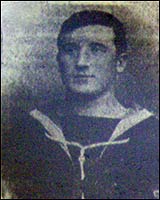 |
|
AB Douglas Barnes
|
The Rushden Echo, 18th December 1914, transcribed by Jim Hollis.
Rushden Seaman at Work - A Scrap with The Turks
Guns and Telegraph Station Taken - No Damage to British Ship
Mr. Douglas Barnes, A.B. (Rushden), writes home from H.M.S. Odin, says :
“I suppose you know we have been at war with Turkey? This is where we come in. Well, we have had one go at them and we didn’t half see them off! They hit our ship only twice and did no damage. We knocked out their forts, captured four guns and a telegraph station, and landed lots of troops, so I think we didn’t do so bad. Nobody on board got even a scratch. We are expecting another go at any time. Everybody seemed to take it as a picnic party. We don’t know how many were killed on shore. We were firing for about an hour. I hope you are not worrying about me, as I am quite all right. I shall come home full of …..(a whole line here has been obliterated by the censor)….it won’t last long. I don’t know when I shall be able to write again, as we have only just heard that we could send this one.”
|
Rushden Echo, 18th December 1914, transcribed by Kay Collins
“Germans Sang Two Hymns” – The wished us Good Night
Rushden Soldier within 100 Yards of the Enemy
Cheery news comes from Private J. Soutar (Rushden), of the Royal Fusiliers. Writing to his brother from the front, he says:-
“I have the ‘Rushden Echo’ sent to me and am glad to read it. You might send me any old papers you like. We are in the trenches, up to our eyes in mud, and I live in a hole something like a rabbit’s hole. I am getting on fine and am already used to it. I must ask you to thank the ‘Bosses’ for the parcel I received. I have not seen anything of Fred yet (Private F. Dowsett, of Rushden, of the Grenadier Guards). I believe he is in the same division as our 4th Battalion. I don’t know whether Private Len Garrod is with them. I am the only one here from our part now. My chum who sent you the parcel got shot in the head and was killed. I don’t know his name but he is well known at Islip. (We understand his name is Bower.—Editor)
Tell mother not to worry about me as I am doing the best I can. I hope Fred gets back all right for the sake of his wife and children. I should love to come across him out here.
“I think the Germans have had about enough of it. They sang us a couple of hymns the other night and shouted ‘Good-night’ to us. We are only 100 yards apart. I was reading in the ‘Rushden Echo’ about soldiers saying the Germans could not shoot. They can shoot as well as we can when they are in the trenches. If you just show your head above the trench there is a bullet comes ‘ping’ at it. It is a treat to see our airmen flying about here with 50 German shells going at them. They are brave and doing a lot of good. When it rains it is rotten in the trenches. ‘It’s a wrong way to Tipperary!’ Ask Matey what he thinks of the beer tax!”
|
Evening Telegraph, Saturday, 19th December 1914, transcribed by John Collins.
Rushden Driver with Australian Contingent
In a letter home Driver Harry Meadows (of the 5th Battery A.F.A.) 2nd Brigade Field Artillery, 1st Australian Division) gives his mother an interesting account of his voyage with fellow-soldiers back to England. It was three years last July since, through the agency of Mr. Henry Raby, of Kettering, he booked his passage to the Antipodes, left Rushden and “the dear homeland” – as he affectionately alludes to the Old Country – and took to farming “down under”. His brother, by the way, is in the office of the Kettering Gas Company. Driver Meadows writes: “I am on my way with the Australian contingent; they are a fine lot of young fellows. We left camp at 3.15 a.m. on 20th October, arrived at Port Melbourne 8.30 a.m., loaded the horses, and sailed at three o’clock.” After referring to the Sydney’s eminently satisfactory way of dealing with the Emden, he says: “When the Sydney passed us we were not allowed to cheer on account of the wounded.”
|
The Wellingborough News Friday 25 December 1914, transcribed by Nicky Bates
Local War Items - Fighting Brothers
Pte A Allen, of the Hussars, on active service writes to his sister, Mrs Lack, of 17 Cromwell road, Rushden, a letter dated December 14th. He expresses thanks for the Xmas pudding and pies sent, and the "smokes". (He does not smoke, so chocolate was sent). The troops got plenty of smokes he says and also warm clothes, in fact everything was being done for the soldiers' comfort. They were having bad weather, and the water and mud was over shoe-tops, making it very difficult to get about with supply wagons. "But still," he says, "roll on the New Year and see what that brings us." He concludes by saying he has not seen anyone from Rushden.
Corpl F Allen, his brother, in the 1st Northamptons, writes to Mrs Lack of the 18th and he says he had a good time with the plum-pudding and mince pies sent him. He would very much like to see a Rushden "Argus", and we shall send him one.
|
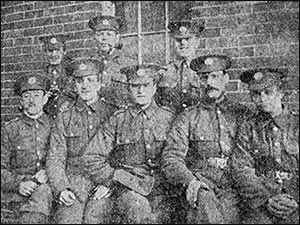 |
|
Back row: Privates Eley, A. Trussler, W. Bailey.
Front row: Lance-Corpl. A. A. Mepham, Privates W. Linnett, W. Parker, A. Ford, T Cook.
Picture by A A Mepham
|
Rushden Argus, 25th December 1914, transcribed by Kay Collins
Anxious to Have a go at the Germans
We print this group of Rushden soldiers now at Shorncliffe. They are all feeling well and fit and are looking forward to having a "whack at the Germans." Most of them had military training previous to joining the 5th Battalion Northants Regiment. Lance-Corpl. Mepham has recently earned the promotion from private.
|
Rushden Echo, 25th December 1914, transcribed by Kay Collins
King Chats with Rushden Man - His Majesty’s Visit to The Front
Local Soldier’s Three Months’ Trench-Fighting
Little news has come lately from Pte. C. Dowsett (Rushden), of the Grenadier Guards. We understand that he has been relieved from 12 weeks’ continual fighting in the trenches. While at the rest-camp King George paid a visit there and had a little chat with him and other soldiers who were there. It is not known how long Private Dowsett remained at the rest-camp but we are told that he may already be back in the firing line again. He is practically the only one of his company to escape injury and has had the experience of seeing nearly all his mates shot down or badly wounded. He holds no hope of the war being finished for a few months to come.
|
Rushden Echo, 25th December 1914, transcribed by Kay Collins
Mud! — Up to the Knees in it.
Pte. G. Dodson, of the Royal Field Artillery, chauffeur to Mr. John Clark, of Rushden, writes from the front to Mr. Clark as follows:- "Thank you very much for the parcel. We are getting on very well for presents. We are having some rather bad weather; it is up to our knees in mud. We shall be glad when the sunny days come again for this job. I do not see any hope of getting home yet. We are getting on as well as we can expect." [possibly of Irchester?]
|
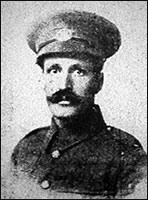 Rushden Echo, 25th December 1914, transcribed by Kay Collins Rushden Echo, 25th December 1914, transcribed by Kay Collins
Private A Fuller (Rushden), of the Northants, who has fought in the South African War. His experience was recognised by the War Office who placed recruits under his charge recently at Weymouth. Private Fuller ("Prince") was also put in charge of the Army Telephone exchange. He is now guarding the coast at Sunderland.
[his brother Sgt. H. Fuller]
|
|